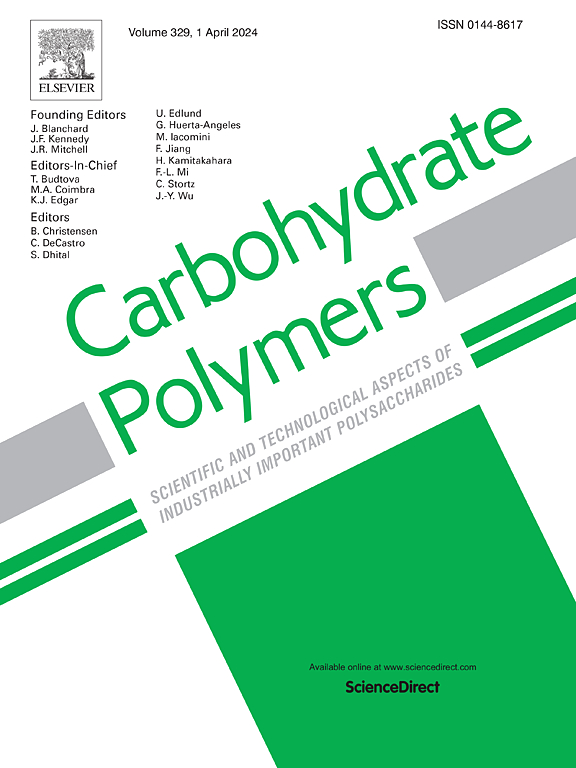Production of flame-retardant phosphorylated cellulose nanofibrils by choline chloride based reactive deep eutectic solvent
IF 12.5
1区 化学
Q1 CHEMISTRY, APPLIED
引用次数: 0
Abstract
Nanocellulose, a biomass resource known for its abundance, renewability, environmental friendliness, and nanoscale size, has garnered significant interest from researchers. However, it is a type of carbohydrate that burns very easily, which limits its applications, especially in areas where good thermal stability and low flammability are requested. In this study, phosphorylated cellulose fibers (P-CF) was prepared via ternary choline chloride/urea/ phosphorous acid reactive deep eutectic solvent (RDES) pretreatment. The influences of different conditions (reaction temperature, time, mass ratio of cellulose to RDES and molar ratio of choline chloride/urea/ phosphorous acid) on the charge density and yield of P-CF were studied. Phosphorylated cellulose nanofibrils (P-CNF) with an average width of 5.1 ± 0.2 nm were obtained after subsequential ultrasonication. The peak heat release rate of P-CNF was reduced by 89.1 % compared with unmodified softwood pulp, and the limiting oxygen index value increased to 44.8 %. Furthermore, the fabricated P-CNF based film demonstrated good self-extinguishing behavior in both horizontal and vertical combustion tests, high transparency (visible-light transmittance above 80 %) and robust mechanical properties. This developed RDES system provided a new and sustainable route to prepare intrinsically flame-retardant nanocellulose, which may have potential applications in many fields such as thermal insulation, and electronics.

利用基于氯化胆碱的反应性深共晶溶剂生产阻燃磷化纤维素纳米纤丝
纳米纤维素是一种生物质资源,以其丰富性、可再生性、环保性和纳米级尺寸而闻名,引起了研究人员的极大兴趣。然而,它是一种非常容易燃烧的碳水化合物,这限制了它的应用,尤其是在需要良好热稳定性和低可燃性的领域。本研究通过氯化胆碱/尿素/磷酸三元反应深共晶溶剂(RDES)预处理制备了磷酸化纤维素纤维(P-CF)。研究了不同条件(反应温度、时间、纤维素与 RDES 的质量比以及氯化胆碱/尿素/磷酸的摩尔比)对 P-CF 电荷密度和产率的影响。经过后续超声处理后,获得了平均宽度为 5.1 ± 0.2 nm 的磷化纤维素纳米纤维(P-CNF)。与未改性的软木纸浆相比,P-CNF 的峰值热释放率降低了 89.1%,极限氧指数值提高到 44.8%。此外,基于 P-CNF 制成的薄膜在水平和垂直燃烧测试中均表现出良好的自熄性能、高透明度(可见光透过率超过 80%)和坚固的机械性能。所开发的 RDES 系统为制备本征阻燃纳米纤维素提供了一条新的可持续途径,它可能在隔热和电子等多个领域得到潜在应用。
本文章由计算机程序翻译,如有差异,请以英文原文为准。
求助全文
约1分钟内获得全文
求助全文
来源期刊

Carbohydrate Polymers
化学-高分子科学
CiteScore
22.40
自引率
8.00%
发文量
1286
审稿时长
47 days
期刊介绍:
Carbohydrate Polymers stands as a prominent journal in the glycoscience field, dedicated to exploring and harnessing the potential of polysaccharides with applications spanning bioenergy, bioplastics, biomaterials, biorefining, chemistry, drug delivery, food, health, nanotechnology, packaging, paper, pharmaceuticals, medicine, oil recovery, textiles, tissue engineering, wood, and various aspects of glycoscience.
The journal emphasizes the central role of well-characterized carbohydrate polymers, highlighting their significance as the primary focus rather than a peripheral topic. Each paper must prominently feature at least one named carbohydrate polymer, evident in both citation and title, with a commitment to innovative research that advances scientific knowledge.
 求助内容:
求助内容: 应助结果提醒方式:
应助结果提醒方式:


